Outsider in the White House (21 page)
Read Outsider in the White House Online
Authors: Bernie Sanders,Huck Gutman

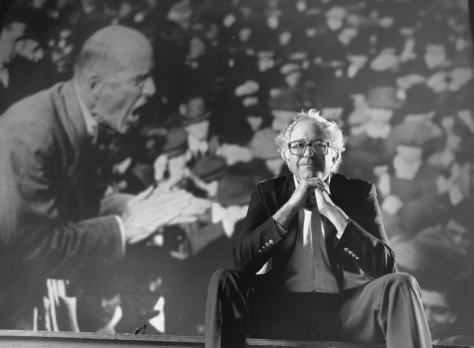
© Getty Images 2015
Running for Congress in 1990. Featured in the backdrop is the labor organizer and presidential candidate Eugene Debs.
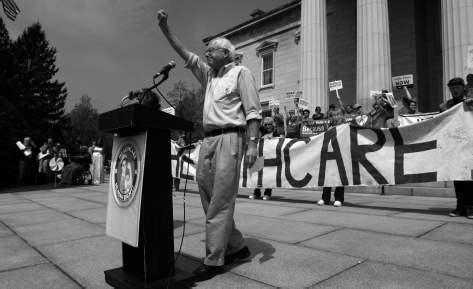
© AP Images 2015
Addressing a crowd gathered outside the Vermont statehouse to express support for a single-payer health care system (May 1, 2010).
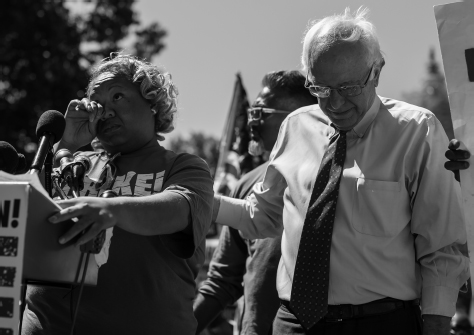
© AP Images 2015
At a rally pushing to raise the minimum wage to $15 an hour, I stood beside Sontice Bailey as she spoke movingly to the crowd. Her low pay meant Bailey was unable to take time off work from her two jobs during her pregnancy, which ended in miscarriage (July 22, 2015).
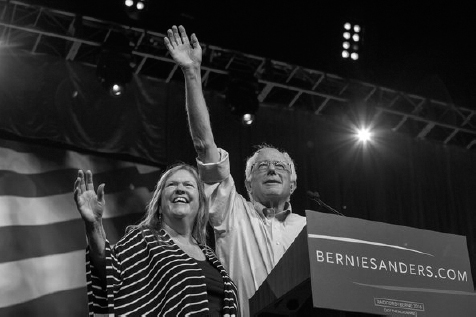
With Jane during my presidential primary campaign, at the Los Angeles Memorial Sports Arena (Aug. 10, 2015).
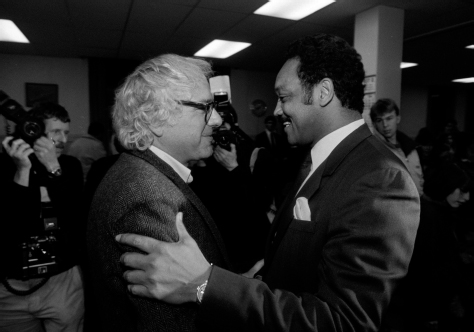
© AP Images 2015
Greeting presidential candidate Jesse Jackson, Montpelier City Hall (Dec. 31, 1988). That night I endorsed Jackson in front of a thousand-strong crowd.
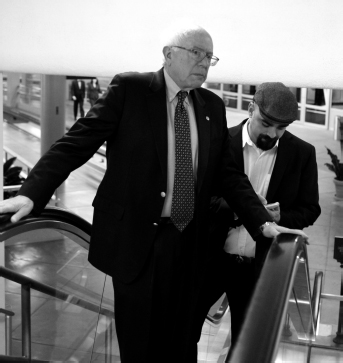
© AP Images 2015
Heading for the Senate floor where I spoke for eight and a half hours against renewing Bush-era tax cuts for high earners (Dec. 9, 2010). The marathon speech made national headlines and kick-started a movement to get me to run for president.
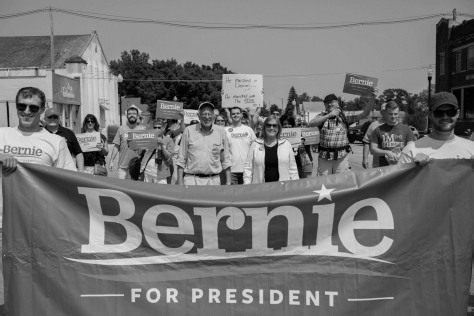
Marching with Jane as part of a July 4
th
parade on an early leg of my campaign to win the Democratic presidential primary (Denison, Iowa).
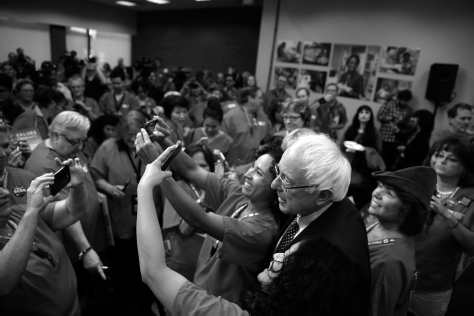
© AP Images 2015
Members of National Nurses United on the day the union publically endorsed my candidacy in the presidential primary, Oakland, Calif. (Aug. 10, 2015).
When you run a campaign you have to become an expert in all kinds of things: mail solicitation, direct mail, postal rates, buying drive-time slots for radio advertising, writing campaign brochures and laying them out, estimating printing costs, purchasing buttons and bumper stickers, scripting radio ads, and editing television slots. Believe me, a campaign is more than just giving speeches and turning up at debates.
Our third goal was to do a better job using the telephone. Yes. I apologize. We also engage in that activity hostile to human sentiment, telephone canvassing. Generally, most congressional candidates and political parties hire professional telemarketing organizations that are located in South Dakota or some other faraway place. I think that the geographical location of the company is dependent upon the callers being “accent free”âVermonters would not appreciate callers with an Alabama accentâand the cost of labor being cheap. These companies have hundreds of workers who do nothing else but dial phones automatically, give the same spiel over and over again, and type the results into a computer. “Yes. I intend to vote for Congressman Jones no matter what happens.” Strong supporter. “No. I haven't a clue as to who is running for office. Is there an election coming up this year?” Undecided.
For years, we have argued among ourselves about the advantages and disadvantages of making calls in-state or out of state. The clear advantage of making the calls through a professional telemarketing company is that they'll get made. You put down your money, and they can make fifty or one hundred thousand callsâwhatever you want to pay for. And you'll get voter ID responses back nice and clean, done by professionals. It's expensive, but it's simple.
The disadvantage of this approach is that the people who are making the calls couldn't care less about what they're doing. They don't know Vermont, they don't know Bernie Sanders, and some of that will surely come through. Also, when it works well, telephoning is an excellent activity for our volunteers. It is very effective for a supporter in Hinesburg, Vermont, to call a neighbor and talk about the campaign. You can't beat that. But it's very hard to get the number of volunteers that you need to make any sizeable number of calls. A lot of folks, quite understandably, do not like calling up strangers. Also, given the fact that our callers are not professionals, and that they're not working on computers, some of the results come back a bit jumbled.
Once again, after a lot of discussion, we decided to do our telephoning in-state. We have to get lists of registered voters and phone numbers to our volunteers, order a bunch of telephones for our officeâand do the best we can. Although Tom Smith is doing an excellent job in coordinating this, and we're doing better than in the last campaign, we're still struggling. On any given night we only have three or four people on the phones. People say they'll come in, and don't. I have my doubts as to how successful our overall telephone campaign will be. It will be better than last campaign, but still won't be very good.
You don't have to be a political genius to know that if you function alone, there are real limits to what you can accomplish. The Democrats have their party, the Republicans have theirs. As an Independent, functioning outside the two-party system, I have worked hard throughout my political career to bring people together into the progressive movement in the fight for social justice.
When I was first elected mayor of Burlington, I knew that a progressive agenda could never be implemented without the efforts of a strong and successful political movement. Working with other progressives in Burlington, we created the Burlington Progressive Coalition, which, in the city, has been a de facto political party for the last fifteen years. During that time, the Progressive Coalition has elected two mayors, dozens of city councilors and school board members, and four representatives to the state legislature.
Statewide, we have not developed a formal third party. I have, however, been active with many others in creating a strong Vermont progressive movement, which over the years has, among other activities, run a number of candidates for state legislature.
Obviously, when I took office in Congress in 1991, the dynamics were very different than those in Vermont. I was the only Independent in Congress, the only person outside the two-party system. There was no way that was going to change in the next two years. In Congress, there were Republicans, Democrats, and meâand that was that. Given that reality, I thought hard about the political role I could play.
After a short time in Congress, I decided to try to bring together the most progressive members so that we could more effectively fight for economic justice. There were already a number of caucuses in Congress, some of them doing excellent work, but there was no group explicitly fighting for a progressive agenda to address the needs of America's working people.
